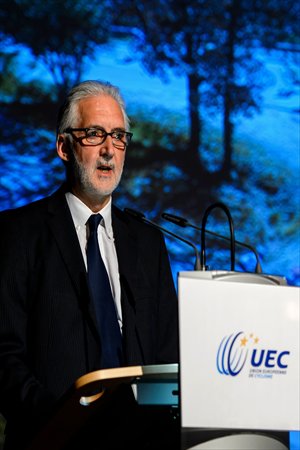HOME >> SPORTS
Cookson faces huge battle to restore trust
Source:Reuters-Global Times Published: 2013-9-29 5:03:02

Cyclists pass Big Ben and Houses of Parliament during stage eight of the Tour of Britain in London on September 22. Photo: CFP

Brian Cookson Photo: CFP
After a farcical election process that further damaged the International Cycling Union's (UCI) credibility, new president Brian Cookson faces a monumental challenge to restore trust in a sport crippled by scandals.Briton Cookson was elected president ahead of Ireland's Pat McQuaid, who was seeking a third term, after five hours of heated debate about whether the outgoing president should have been allowed to stand after questions over whether his nomination was valid.
In his opening comments, Cookson called for unity in the cycling family, which will be a difficult task.
"It's been a pretty destructive campaign so the biggest challenge is to get everyone reunified," Garmin-Sharp manager Jonathan Vaughters, who supported Cookson, told Reuters.
"Everyone needs to step back, swallow their pride or walk away and the people who won should not get carried away. We have a new leadership to fix the problems but the problems aren't fixed."
Members of the UCI's sports services, who declined to be identified, complained that the Cookson camp "sprayed" the voting delegates with money to swing the vote, which the Briton won 24-18.
McQuaid, however, had said before Friday's sometimes controversial election that he would go quietly if beaten after eight years in charge.
"Brian has set out what he intends to achieve over the next four years and I would encourage all cycling federations to support his efforts to work for the good of the sport," said McQuaid.
McQuaid will likely be followed out of the sport by his predecessor Hein Verbruggen, the man who has repeatedly said that Lance Armstrong had never cheated, before the American, now stripped of his seven Tour de France titles, confessed he had been on drugs.
According to Vaughters, Cookson's election will improve the UCI's relationships with all the anti-doping bodies, after repeated conflicts with the World Anti-Doping Agency (WADA), the US Anti-Doping Agency (USADA) and the French Anti-Doping Agency (AFLD) over who should have control of anti-doping.
Vaughters also said the International Olympic Committee (IOC), which has the power to add or withdraw sports from the Olympic Games, would take notice if relationships were better with all the anti-doping bodies.
Independent anti-doping body
After Cookson's election, IOC spokesman Mark Adams said, "We of course congratulate him and look forward to working with him."
USADA's reaction was predictably more enthusiastic.
"The outcome of the UCI election sends a powerful message that sport leaders who fail to fully protect the rights of clean athletes and the integrity of their sport will be held accountable," USADA, whose investigation led to Armstrong's downfall, said in a statement.
"The UCI tried to obstruct our investigation into doping in cycling at every turn, and then, after the release of our reasoned decision, the previous leadership failed to take necessary and decisive action to fully clean up the sport.
"The election of a new UCI President who is committed to transparency and a new direction, is a monumental moment for the sport."
In a statement sent to Reuters, WADA said it looked forward to working with the new president.
"WADA also welcomes any efforts taken by organizations to help ensure clean sport and maintain the rights of clean athletes and we look forward to continuing to work alongside the UCI in the future," the statement said.
Turning point
British Olympic Association chair Seb Coe said the election of Cookson represented a turning point for cycling.
"It was with vision, determination and a genuine commitment to work in partnership that Brian was able to lead the transformation of British Cycling, and I am confident he will do the same for the UCI," Coe said in a statement.
McQuaid has often been labeled as Verbruggen's puppet. Cookson, himself, has been backed by Russian oligarch Igor Makarov, the Katusha professional team owner.
Whether Cookson will stay independent from the man who helped him secure the backing of the European Cycling Union, and its 14 delegates could determine his presidency.
Cookson is in favor of a truth and reconciliation process, even though he is not comfortable with the name.
"We need to look at the analysis of what has gone wrong. People have talked of a truth and reconciliation commission. I'm not entirely comfortable with those words but we certainly need to have a thorough review," he said this month in a conference call with a select group of reporters.
"I want to get that under way as soon as I can in the first few weeks of my presidency."
The Briton's first move sends an encouraging message as he looks to set up an independent anti-doping authority. Quizzed about specifics on Friday, Cookson said he would call WADA on Monday to set it in motion.
Cookson's job will also be to continue the globalization of cycling started by McQuaid and his team.
Qatar delegate Majid Ahmed Al Naimi said, "I think change is something acceptable everywhere, nobody will remain in this position forever.
"We hope, as everybody hopes, the new president also will push forward cycling, particularly in the third world, particularly in the Middle East, in Africa and Asia because I think we are on the right path now but we need big support from the new President."
Reuters - Global Times
Posted in: Feature, Miscellany